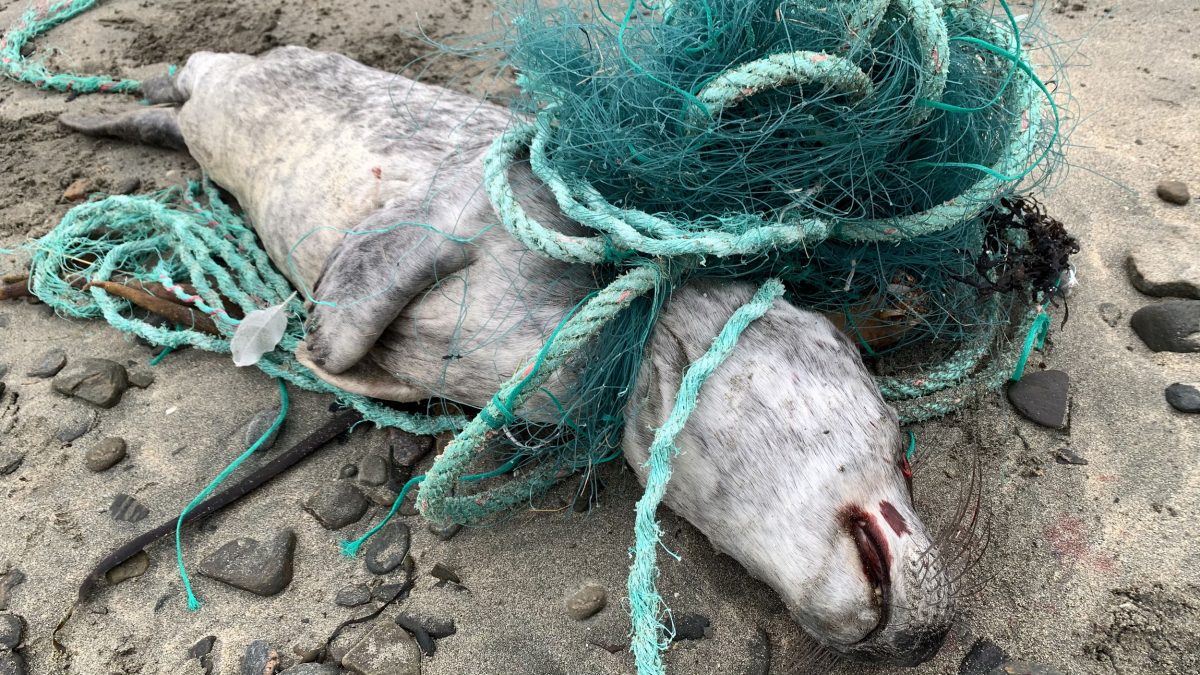ANIMAL campaigners have been left furious after a young seal pup was found washed up on a Scots beach after suffering an “agonising” death from discarded fishing nets.
Naturalist Hugh Harrop was heartbroken after finding the dead Atlantic grey seal washed ashore on Spiggie Beach, Shetland, yesterday morning.
The 52-year-old was alerted to the pup by islander Duncan MacKay who stumbled across the deceased animal, believed to be around a year old, while out on a walk.

Distressing images show the seal pup’s lifeless body laying in the sand with a large mass of green gill net entangled around its neck.
The net is wrapped tightly around the pup’s neck while bloodstains can be spotted across the poor animal’s head and mouth.
A large part of the discarded fishing net has collected in a large knot around the top of the seal’s head.
Marine animal campaigners Blue Planet Society today branded the incident a “disgrace” and asked when more would be done to hold those who are responsible to account.
A spokesman for Blue Planet Society said: “This poor seal has been killed in an agonising way by what is referred to as ‘ghost fishing gear’.
“We prefer to call it fishing industry pollution. It’s a disgrace, and just as bad as an oil or chemical spill.
“When are marine policy makers going to start holding the fishing industry to account?”
Hugh, who founded Shetland Wildlife, said: “I was heartbroken, you never want to see an animal injured or distressed and for the animal to be so common around our shores doesn’t retract from that.
“It’s a young male and the fact that it has effectively died at the hand of such a horrific cause of death has had 25-35 years of life taken from him.
“Witnessing events of this nature ranks as one of the most horrific cases of entanglement I have ever seen.
“I’ve seen quite a lot of cases over the years and that’s without doubt the worst considering the size of the coast like this is happening so much more than we’re aware of.
“We are only aware that this has happened if animals wash up on the shore.
“This is an issue that needs addressing and not just in Scotland but globally.”
Hugh shared images of the seal on Twitter yesterday, writing: “So sad to see this young Atlantic grey seal entangled to death in a discarded gill net and washed ashore at Spiggie, Shetland.
“Apologies if the images upset you but this is the harsh reality of how wildlife is suffering from the 1000s of tons of ‘ghost gear’ polluting our oceans.”
The post has since collected 1,200 likes and comments from users who were shocked by the awful scene.
@Lauren4278 said: “This is the main reason why I stopped eating fish. Half of the plastic in the ocean comes from fishing.”
@allen_tanya said: “I still don’t understand how boats are allowed to just cut it free.
“Why is there not better prevention? They weigh their gear before they depart and on their return.
“Or maybe they have a member of the crew fully trained to dive to help return it safely to the boat if it is stuck.”
@allen_tanya said: “It’s so sad that animals always pay the price for our misdemeanors.”
@drowsyfire said: “Poor creature, it must have suffered terribly.”
Orkney and Shetland MP Alistair Carmichael has arranged a meeting with Defra secretary of state George Eustice to address ongoing troubles with the netting.
He hopes to confront the issue where predominantly Spanish gill-netters are dumping their fishing gear in the sea.
It is currently illegal for Scottish fishermen to do the same in Scottish waters.
Speaking in parliament, Carmichael said: “The fishing industry in Shetland is being hammered by Spanish boats engaging in the completely unsustainable practice of gill-netting.
“I have spoken to the fishing minister about this in the past. What is being done to stop it or to ensure that, if it is to be done, it is to be done safely?”
Gill nets are renowned for their lethal impact on seabirds by bycatch, so much so that it is estimated that 400,000 birds are killed by the fishing nets every year.
The use of gill nets has been prohibited in Scottish waters since 1996 when The Inshore Fishing Order was passed.
The Shetland Fishermen’s Association had hoped that the issue would be resolved when Britain left the European Union.